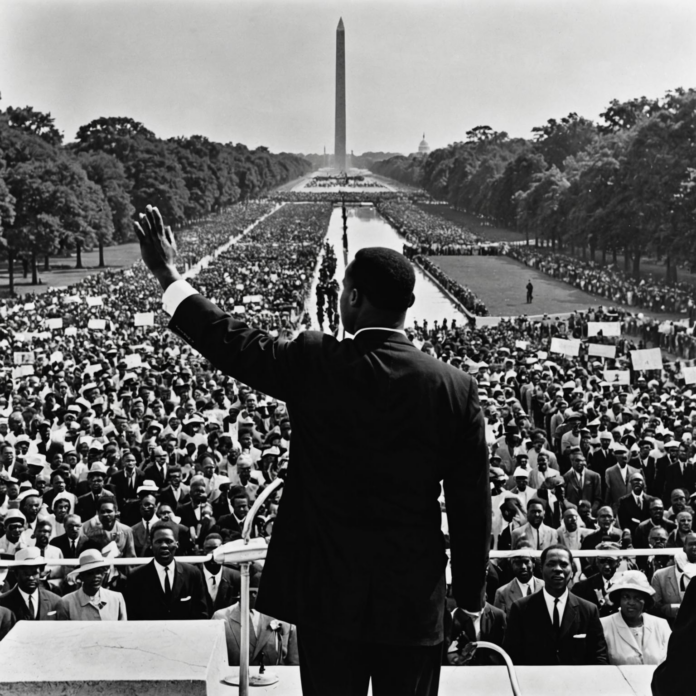Dr. Martin Luther King Jr.’s ‘I Have a Dream‘ speech was a pivotal moment in the civil rights movement, delivered in 1963 at the Lincoln Memorial.
Join me as we explore how this speech highlighted America’s shortcomings in achieving equality and inspired significant change.
Understanding the Message
- King called for an end to racial discrimination and the need for equality.
- He emphasized judging people by their character, not their skin color.
- The speech pointed out the unmet promises of the Emancipation Proclamation.
- It inspired the Civil Rights Act of 1964 and continues to motivate justice movements.
- King’s words remain a symbol of hope and unity in the fight for civil rights.
The Historical Scene
During the 1963 March on Washington, Dr. King stood at the Lincoln Memorial to deliver his famous ‘I Have a Dream‘ speech, highlighting ongoing racial inequality despite the Emancipation Proclamation.
This moment reminded everyone of Abraham Lincoln’s legacy and the unfulfilled promise of freedom, pushing for the Civil Rights Act.
By addressing systemic racism, King honored the past and inspired future efforts for true equality.
Watch more about this historic event: [YouTube link]
Central Ideas
King’s speech weaves together themes of racial equality and justice, rooted in the Emancipation Proclamation.
He dreams of a nation where character matters more than skin color, promoting unity and equality.
This vision was key in inspiring the Civil Rights Act of 1964, leaving a lasting impact on American law.
King’s hopeful message continues to drive justice movements, reminding us to serve others and strive for true equality.
Rhetorical Magic
King’s speech is powerful due to his use of rhetorical techniques, like rhythmic repetition with phrases such as ‘Let freedom ring‘ and ‘I have a dream.’
Referencing ‘five score years ago‘ ties his speech to Lincoln’s Gettysburg Address, placing it in historical context.
He contrasts broken promises with a future where ‘four little children’ are judged by their character.
These techniques emphasize King’s dream and inspire listeners to pursue justice and equality.
Impact on Society
The ‘I Have a Dream’ speech significantly influenced the civil rights movement, leading to legislative changes and public support for racial equality.
King’s vision of a nation judged by character resonated deeply, helping pass the Civil Rights Act of 1964.
| Keywords | Impact | Legacy |
|---|---|---|
| Civil Rights | Legislative advancements | Pivotal historical figure |
| Equality | Galvanized public support | Continued inspiration |
| Racial Discrimination | Highlighted ongoing issues | Solidified commitment to change |
| Unity | Strengthened collective movement | Unified diverse audiences |
King’s message continues to inspire progress in the fight for civil rights and justice.
Legacy and Modern Relevance
Even today, the ‘I Have a Dream‘ speech influences discussions on civil rights and social justice.
King’s vision of character-based judgment inspires efforts for economic justice and against discrimination.
His call for economic equality is relevant as we face income inequality. The speech’s legacy is evident in its role in the Civil Rights Act of 1964, shaping modern policies.
This message of hope and unity encourages us to work towards a just society where everyone has equal opportunities.
Inspiring Words
Quotes from King’s ‘I Have a Dream‘ speech continue to inspire the fight for equality and justice.
When he dreams ‘that my four little children will live in a nation judged by character,’ he captures unity and hope.
His call to ‘let freedom ring‘ urges us to envision a just world. By proclaiming ‘We hold these truths,’ King reinforces foundational values.
These quotes inspire us to serve others and pursue equality relentlessly.
Reflections
Reflecting on Dr. King’s speech, I see how its historical context, compelling themes, and masterful rhetoric fueled the Civil Rights Movement.
Its impact still resonates, inspiring ongoing struggles for equality. King’s dream of a just society remains a benchmark and a call to action.
His words remind us that while progress has been made, the journey toward true equality continues, urging us to persist in our fight for justice.
